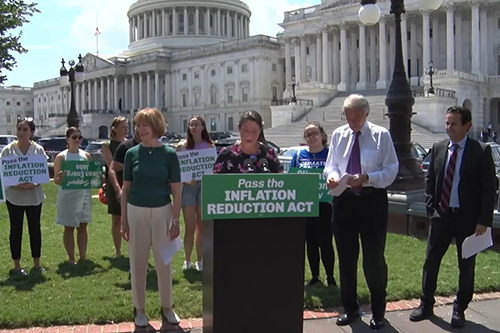Slicing the pieces of the Inflation Reduction Act pie | Jimmy Rodefer
The freshly-baked 755-page Inflation Reduction Act, out of the legislative oven and the law of the land, is like a pie being scrutinized by Americans wondering how large or small is the act’s effect on their pieces.
The big-corporation 15% alternative minimum tax on $1 billion or more in average financial statement income (over three consecutive tax years) after Dec. 31, 2022, has many advocates and detractors. For the purposes of this discussion the focus will be on inflation, taxes and deficits. Three main points are:
1. The tax applies to corporations with average adjusted financial statement income exceeding $1 billion; adjusted financial statement income is calculated by deducting tax depreciation rather than financial statement depreciation.
2. As a result of the $1 billion threshold, these taxes will apply to a relatively small number of companies, about 150, though customers of those companies include a huge percentage of the population.

3. A lower income threshold of $100 million applies to U.S. entities that are part of a foreign-parent multinational group if the foreign parent’s adjusted financial statement income meets or exceeds the $1 billion amount.
Passed by Congress and signed into law by President Joe Biden, the in practical terms the Inflation Reduction Act will have almost no impact on inflation, according to reviews by such diverse sources as the Congressional Budget Office and the Wharton School of Business of the University of Pennsylvania. Neither over a 10-year period will the act affect with more than a pin-prick the nation’s budget deficits and debt.
Every election season there are calls among candidates for corporations to pay their “fair share” in taxes. But in a sense, for tax purposes a business is a form of pass-through entity: it passes its increased costs on to those who buy its products. It’s either that or cut budgets, which affects hiring, wages, benefits and company growth. This is an economic fact of life: for every government action there is a marketplace reaction.
The present corporate tax rate is 21%, but as major corporations are in some cases able to pay zero dollars in federal taxes, the act was promoted as a means to make them pay their “fair share.” However, among the act' heavyweight critics were the National Association of Manufacturers, which said it would increase taxes on American manufacturers, and Associated Builders and Contractors, which issued a statement that said of the bill, “ABC believes that the bill’s anti-competitive policies will handicap merit shop construction contractors and further jeopardize the nation’s economy at this critical time.” Proponents of the act point as victories to new incentives and tax credits for “clean” energy and a cap on what seniors on Medicare can be charged for prescription drugs (which has its own costs as well).
With respect to inflation, in a letter to U.S. Sen. Lindsey Graham, the Congressional Budget Office said the bill’s effects in 2022 would be “negligible,” and in 2023 inflation would probably be higher or lower by only 0.1%. The Penn-Wharton Budget Model analysis states, “The Act would very slightly increase inflation until 2024 and decrease inflation thereafter. These point estimates are statistically indistinguishable from zero, thereby indicating low confidence that the legislation will have any impact on inflation.”

THE LATEST NEWS RIGHT AT YOUR FINGERTIPS
Get the latest local news, sports scores and more directly on your phone. Download the free Knox News mobile app.
The bill is said to reduce U.S. spending deficits by up to $300 billion over a 10-year period. That’s at least something, but CBO budget projections through 2032 are cause for concern: “CBO’s projections, assuming that current laws generally remain unchanged, the federal deficit totals $1.0 trillion in fiscal year 2022 and averages $1.6 trillion per year from 2023 to 2032.”
Negotiations preceding the act's passage were to enable corporations to make net operating losses a factor in reducing the 15% tax. Affected corporations can be expected to seek every legal way possible under the new law to reduce their tax liability.
But the law is only the start: the act's implementation regulations will now be written, and those regulations will be lengthy and complex. In the meantime, armies of experts in the tax field are combing through the original legislation to anticipate the regulations’ direction.
What’s known for sure about the Inflation Reduction Act is that its full implications are unknown. What is known is that it’s law, and everyone is looking for ways to either gain, or not lose, pieces of their financial pies.
Jimmy Rodefer is CEO of Rodefer Moss & Co., headquartered in Knoxville, and with offices in Tennessee and Virginia. Contact him at www.rodefermoss.com/Knoxville.
This article originally appeared on Knoxville News Sentinel: Jimmy Rodefer: Slicing the pieces of the Inflation Reduction Act pie
